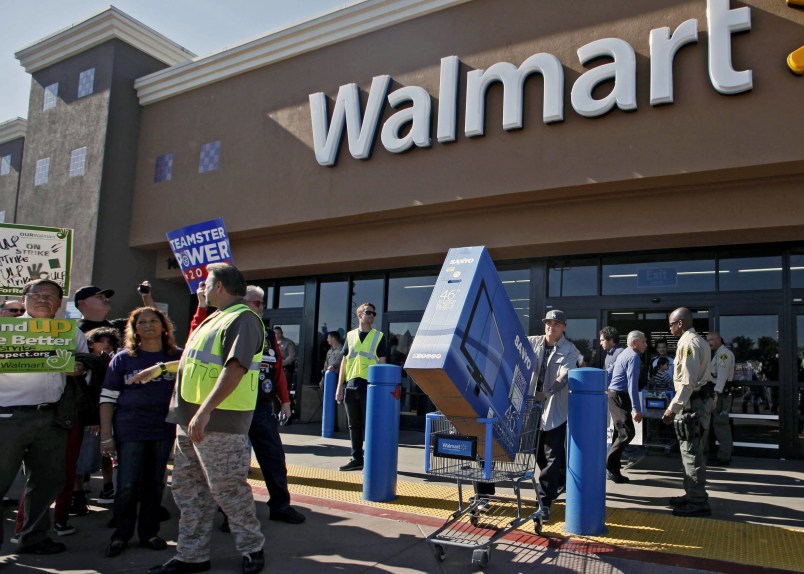The day after Thanksgiving, Wal-Mart employees will hold as many as 1,500 Black Friday protests throughout the country in opposition to the retail giant’s persistent low wages, poor benefits, failure to promote, illegal retaliation against organizers and other dismal management practices. The protests occur just days after an Ohio Wal-Mart store held a Thanksgiving food drive for its own workers — many of whom earn under $25,000 per year and rely on food donations — an event that even Ashton Kutcher couldn’t stomach. Meanwhile Wal-Mart made nearly $16 billion in profits in 2011, and soon-to-be former Wal-Mart CEO Mike Duke earned $18.2 million in 2012.
The Black Friday protests culminate a banner period in labor activism. Heightened organizing among workers in many sectors — retail, fast food, domestic work — is occurring with good reason. As the status of the American worker today continues to be on shaky ground, policymakers are barely beginning to address the problem of low wages that keeps so many workers struggling to stay afloat.
The term “Black Friday” was originally coined in the 1960s, and has come to signify the Friday after Thanksgiving shopping day when retail giants rake in generous profit (this was supposedly the day that moved retailers from being in the “red” to being in the “black”). And in the 1960s, opportunities for the American worker were far different than today. The American Prospect recently published an extensive piece about the evolution of work over the last several decades, pointing out that “In 1960, the three largest employers were high-wage unionized manufacturers or utilities: General Motors, AT&T, and Ford.”
But one event that occurred in the 1960s began to shift this jobs picture: Wal-Mart first opened its doors in 1962, and right off the bat the retail giant began paying its workers 58 cents an hour, half of the federal minimum wage (yes, in those days, minimum wage was $1.15 per hour).
Even back then, company founder Sam Walton tried to persuade the federal government that his business model should enable him to skirt minimum wage laws — something the Department of Labor rejected.
Fast forward to 2013, and the entire scenario described above has evolved dramatically, with Wal-Mart holding much more power and influence. As the Prospect pointed out, “[Today,] America’s three largest private-sector employers are all low-wage retailers: Wal-Mart, Yum! Brands (which owns Taco Bell, Pizza Hut, and Kentucky Fried Chicken) and McDonald’s.”
Black Friday has thus come to take on a whole new meaning for many workers who are toiling for these companies but barely earn enough to feed their families.
This year, many Black Friday protests are expected to actually begin at 6pm on Thanksgiving Day itself. Low-wage workers are already struggling to make ends meet, and many are now devoting most of their holiday to advocacy that seeks to pull them out of poverty – an extra shift that the low-wage economy is imposing upon workers.
OUR Wal-Mart, an advocacy group representing Wal-Mart workers, began organizing worker strikes and protests in 2012. The OUR stands for Organization United for Respect, and the group says that this year’s protests will trump last years in turnout. Last year more than 30,000 workers protested on Black Friday.
But on balance, all the recent activism for better wages and working conditions has achieved limited progress. Only a few states and localities have increased their minimum wage, with California’s rising to $10 per hour beginning in 2015. A whopping 23 states still have not increased their minimum wages beyond the federal floor of $7.25.
As Wal-Mart has grown to be a behemoth employer, the game of financing elections has become an important source of power for the retail giant: another advocacy group called Making a Change at Wal-Mart recently found that in the elections held between 2000 and 2012, the Walton family and the Wal-Mart Political Action Committee spent more than $17 million to influence federal elections as well as substantial amounts in state and local elections and ballot initiatives throughout the country. As Wal-Mart eagerly awaits its holiday profits, it is clear that the influence of its money in the political process serves to suppress progress for U.S. workers.
Slowly, however, the tenacity of demonstrations like this year’s Black Friday protests may begin to give the workers’ agenda priority among policymakers. In 2013 a total of 34 states introduced wage legislation that “[provide] for increases to the state minimum wage, addressing base wages for tipped employees, and restricting the authority of local units of government to enact or enforce a local minimum wage,” according to the National Conference of State Legislatures (NCSL).
The Obama administration is now pushing for an increase to the minimum wage to $9, up from $7.25 – though Obama has not endorsed a more aggressive wage increase sponsored by Senate Democrats that would bring the minimum wage to $10.10 per hour. And, the National Labor Relations Board (NLRB) recently announced they plan to file complaints against Wal-Mart for illegally threatening and penalizing workers who protested Black Friday sales last Thanksgiving. The NLRB will proceed with filing complaints if the store can’t settle with its workers on its own.
True, raising wages is not the only long-term solution — policymakers also need to focus on cultivating new, higher-paying opportunities for U.S. workers. But given how dramatically opportunities for workers have devolved over the past 50 years, current attempts at wage increases are still not moving the ball fast enough — a signal that the battle between corporate influence and workers’ rights may intensify in the New Year.
Sheila Bapat is an attorney and writer covering economic and gender justice. Her work has appeared in RH Reality Check, Salon, TruthOut, Jacobin and other publications.






